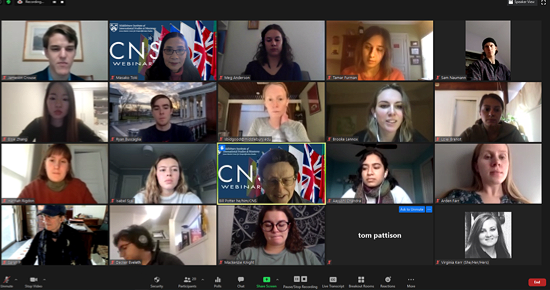January 29, 2021
Masako Toki
The 2020-2021 Online Undergraduate Nonproliferation Fellowship Program at the James Martin Center for Nonproliferation Studies (CNS) has successfully concluded after a two-week long January training (January 4-15), which was the final portion of the program. The Fellowship Program provided undergraduate students with a unique, academically rigorous, enriching, and innovative program despite the challenging situation in which the COVID-19 pandemic necessitated all educational activities to be conducted remotely.

Dr. Potter congratulates undergraduate fellows at the closing ceremony.
After the three-week long online training in the summer of 2020, fourteen undergraduate fellows continued work on independent research projects based on their chosen topic with guidance and advice from CNS mentors.
During the January term training, each fellow completed independent research projects and presented their findings at the end of the program. The fellows’ research topics covered a wide range of issues including nuclear security, humanitarian initiatives in nuclear disarmament, nuclear disarmament verification, the potential use of chemical and biological weapons by terrorist groups, social media and nonproliferation diplomacy, US – Russia nonproliferation cooperation, and 3-D modeling of China’s missile forces. For more information about the fellows’ research topics, please visit the project website.
Furthermore, fellows participated in a series of discussions on timely topics in the field of nonproliferation, disarmament, and arms control. Topics included US nuclear weapons policy under the new administration, the Treaty on the Prohibition of Nuclear Weapons that entered into force on January 22, and COVID – 19: its current status and key issues.
In the face of ongoing challenges caused by the global pandemic that limited educational activities, this fellowship program provided these undergraduate students with an invaluable experience. All fellows shared very positive impressions of the program as reflected below:
“The CNS Undergraduate Fellowship was a very rewarding experience. I was able to learn about the field of nonproliferation in a way that cannot be offered by most home universities, and speak with a variety of experts in the field.”
“My CNS fellowship experience was phenomenal: I feel that my knowledge of the WMD field has greatly expanded due to it, as well as my understanding of the sector’s pertinent issues.”
“This fellowship was such an amazing opportunity, and CNS staff did an incredible job putting this program together. Their innovation and creativity and passion for the students allowed us to take part in an educational and rewarding program during COVID-19. I love the people I met through this program and am really happy with the research I accomplished during it.”
Moreover, although fellows were not able to meet in-person, they were able to foster friendships and bonds with each other while navigating through challenging times as college students in an unprecedented situation.
At the closing ceremony of the fellowship program, CNS director Dr. William Potter congratulated fellows on learning about a variety of nonproliferation topics from CNS experts and for successfully concluding the training. Additionally, the fellows were able to learn from each other’s high-quality presentations. Tom and Sarah Pattison, CNS’s longtime friends and strong supporters of the undergraduate program, added their own warm congratulatory remarks as they encouraged fellows to cherish the connections they have established throughout the fellowship program in the future.
The Covid-19 pandemic might have restricted the educational activities physically, but it did not impede CNS’s commitments to education to promote nonproliferation and disarmament.
The 2020-2021 Undergraduate Nonproliferation Fellowship Program was funded by the Tom and Sarah Pattison Fund, the Carnegie Corporation of New York, CV Starr Foundation, and the Earle Family Fund for International Education.
